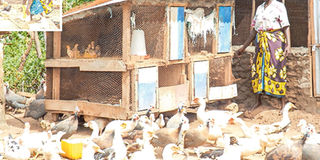You can’t afford guinea fowls? Why not hatch their eggs

Agnes Kandoya on her poultry farm in Kilifi County. She says her journey to poultry-keeping started with Kienyeji chickens that she kept for meat. PHOTOS | BOZO JENJE | NMG
What you need to know:
- Agnes explains that her journey into poultry keeping started with Kienyeji chickens that she was keeping for meat. She started with 20 three months old chicks and raised her flock to 200 chickens.
- Luckily for her, the ducklings turned out to be three female and a male. The duck population has since increased to 30 and she sells each at Sh1,000 each.
- In rearing the birds, Agnes says ducks are heavy eaters compared to the guinea fowls. She feeds them maize germ and Kienyeji mash she buys from an agrovet at Sh1,500 for a bag of 50kg.
- Dr Jumaa Muthoka, a private veterinarian in Kilifi, says the easiest way to start a small poultry farm is to buy the fertilised eggs, identify a broody chicken and let it hatch them and foster the chicks.
As the Seeds of Gold team approaches Agnes Kandoya’s farm in Sabaki on the outskirts of Malindi in Kilifi County, one can hear ducks squawking.
At the gate, one easily picks out a structure made of wood and wire mesh hosting helmeted guinea fowls that Agnes keeps alongside the ducks.
She leads us into a 40 by 30 feet structure where she keeps the ducks in an agribusiness she started in 2017.
Agnes explains that her journey into poultry keeping started with Kienyeji chickens that she was keeping for meat. She started with 20 three months old chicks and raised her flock to 200 chickens.
“I spent Sh6,000 on the chicks that I bought at Sh300 each,” says the mother of six. While she sold some of the birds at Sh600 each, diseases like coccidiosis and New Castle affected her birds prompting her to switch into keeping ducks and guinea fowls early 2018.
“I now keep mainly Pekin ducks and guinea fowls for meat,” she says. She started the business by buying five fertilised duck eggs at a cost of Sh30 each from a neighbour.
“I gave a broody hen to incubate and hatch the eggs. It later took care of the four ducklings that hatched until they reached about a month.”
Luckily for her, the ducklings turned out to be three female and a male. The duck population has since increased to 30 and she sells each at Sh1,000 each.
Agnes used a similar practice to end up with a brood of guinea fowls. She currently keeps 30 and has bettered her brood by exchanging some birds with other farmers to curb inbreeding.
BIOSECURITY MEASURES
“I bought eight fertilised eggs from two different farmers and they all hatched into keets that grew into three roosters and five females,” she says, noting she got a licence from Kenya Wildlife Service to keep the birds.
In rearing the birds, Agnes says ducks are heavy eaters compared to the guinea fowls. She feeds them maize germ and Kienyeji mash she buys from an agrovet at Sh1,500 for a bag of 50kg.
“I sell the birds mainly to families and some have already booked for Christmas festivities. People go for ducks because their carcass weighs 4 to 5kg unlike chickens at 1.5kg,” she points out.
She sells the ducks at between Sh1,000 and Sh1,500 while guinea fowls, which are bought for ornamental purposes, go for Sh3,500 each. Guinea fowls, according to her, lay eggs twice a year under favourable conditions.
“Each can lay six to 12 eggs in a year but they are too secretive in nature. They prefer hidden places to lay their eggs compared to the ducks that can choose open spaces,” she says. She has constructed a small muddy house for them to lay their eggs.
Dr Jumaa Muthoka, a private veterinarian in Kilifi, says the easiest way to start a small poultry farm is to buy the fertilised eggs, identify a broody chicken and let it hatch them and foster the chicks.
“This is achieved for small numbers of birds, making it easier to keep any kind of bird you want from guinea fowls to turkeys.”
Dr Muthoka recommends enhancement of biosecurity measures on the farm to prevent diseases. “You need to fence off the birds’ houses to prevent visitors from reaching them and spreading diseases.”





